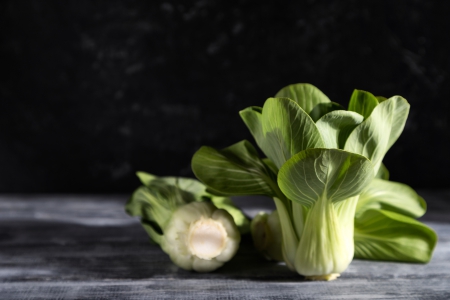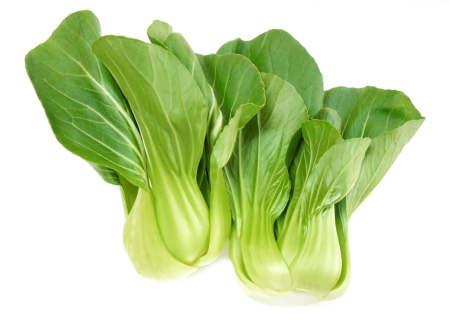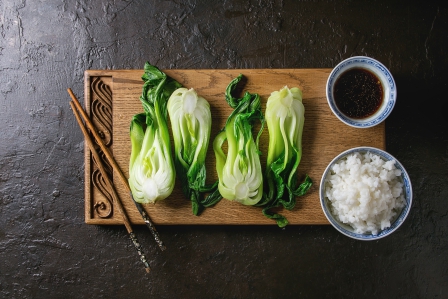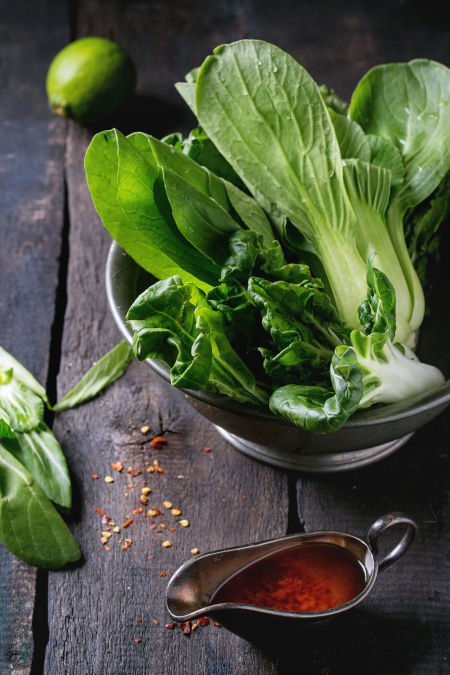Bok choy, also known as pak choi or Chinese cabbage is a nutritious vegetable belongs to cabbage family. It is considered as the top anti-inflammatory food and it is also extensively used for its various therapeutic purposes.
Nutritional overview
- It contains very less amount of carbohydrate hence its consumption does not provide significant effect on glycemic load
- It contains dietary fibre
- It contains negligible amount of fat especially poly unsaturated fatty acid but does not contain cholesterol
- It contains too some extent of protein as well
- It contributes very less amount of calorie as it is poor in macronutrients (that is carbohydrates, proteins and fats)
- It is entirely packed with various important micronutrients such as Vitamin A, Vitamin C, Vitamin K, folic acid, pyridoxine, niacin, choline, calcium, phosphorus, sodium, potassium, zinc, selenium, copper, manganese, iron and magnesium
- It also contains various important biologically active compounds (that are responsible for exerting antioxidant, anti-carcinogenic and anti-inflammatory effects), which include flavonoids, polyphenols, glucosinolates and kaempferol
Biological characteristics
Antioxidant property
- It is totally filled with antioxidant and helps to protect the body from oxidative damages
- It helps to reduce oxidative stress as well
- Quercetin (flavonoid) component of bok choy especially exerts strong antioxidant activities and helps to reduce the risk of developing various chronic diseases like cardiovascular diseases, osteoporosis, lung cancer etc.

Anti-inflammatory property
- Polyphenolic compounds of bok choy are accountable for exerting anti-inflammatory activities
- Sulforaphane component of bok choy also plays important role in reducing inflammation as it helps to facilitate detoxification process by encouraging hepatic functions
- Bok choy is considered as a good source of Vitamin K and its Vitamin K content is also associated with decreasing the risk of unwanted inflammation
Anti-carcinogenic property
- Glucosinolate (sulfur containing compound) component of bok choy is responsible for reducing the risk of cancer
- Brassinin is another important substance found in bok choy acts as an important chemo preventive agent
- It has seen that various compounds are prepared during the digestion of bok choy, which includes nitrile, indole and sulforaphane. All these compounds have anti-carcinogenic activities and help to inactivate carcinogens by protecting cellular DNA from damage
- Consumption of bok choy is very useful for reducing the prevalence of colorectal, breast, prostate and lung cancers
Health benefits
Role on immunity
- Vitamin A and Vitamin C contents of bok choy act as an effective immune booster, which improves immunological responses of the body
- Its antioxidant property also helps to maintain a healthy immune system
- Selenium component of bok choy helps to stimulate the synthesis of killer T cells and promotes immunity
- It is better to consume bok choy in daily diet for strengthening body’s defense mechanism

Role on maternal health
- It is very essential to be consumed during pregnancy as it provides folate (one of the most important nutrients required during gestational period)
- Consumption of bok choy in pregnancy helps to keep the baby as well as the mother healthy
- Its consumption is also related with preventing the prevalence of birth defects like anencephaly and spina bifida
Role on bone health
- Calcium, phosphorus, iron, magnesium and Vitamin K components of bok choy are responsible for promoting bone health
- Its consumption is awfully helpful for strengthening the bones and improves bone mineral density
- The most important feature of bok choy is that it helps to provide nondairy calcium. Individual who have lactose intolerance or milk allergy can consume bok choy as a substitute dietary source of calcium and hence reduces the risk of developing bone disorders by preventing calcium deficiency among them
Role on eye health
- Bok choy contains substantial amount of beta-carotene and Vitamin A hence its consumption is very effective for keeping the eye healthy
- It helps to protect the eye from oxidative damages and promotes vision
- It also helps to improve low light vision
- Consumption of bok choy helps to reduce the prevalence of macular degeneration
- Antimicrobial activities of bok choy are also responsible for preventing eye infections
- It helps to reduce the risk of developing cataract as well
- Consumption of bok choy is extremely effective for treating dry eyes and other eye related disorders

Role on skin
- Vitamin C component of bok choy plays important role in promoting skin health as it helps in collagen synthesis
- It helps to improve complexion
- It also helps to smooth wrinkles
- It helps to protect the skin from the harmful effect of UV radiation
- Its antimicrobial activities are also accountable for preventing microbial infestation within skin thus helps to treat various skin infections like acne, eczema etc.
Role on hair
- Consumption of bok choy is very useful for enhancing hair growth as it provides enough of Vitamin C that promotes collagen synthesis, which is extremely important for keeping the hair healthy
- It also helps to prevent hair loss
Role on digestive health

- Bok choy is well-known for its low FODMAPs content, basically it contains very less amount of fermentable oligosaccharide, disaccharide, monosaccharide and polyols (FODMAPs) hence its consumption is very effective for improving the symptoms of irritable bowel syndrome
- Consumption of bok choy also helps to reduce the prevalence of several gastrointestinal disorders like diarrhea, flatulence, bloating, constipation and stomach pain
Therapeutic applications
Cardio protective effects
- Consumption of bok choy is very effective for promoting cardiac functionality
- Vitamin B6, Vitamin B9 and Vitamin K contents of boy choy are considered as the principal compounds responsible for improving cardiac health as they help to prevent homocysteine accumulation within body
- It has seen that homocysteine in large extent damages artery that increases the risk of developing cardiovascular diseases
- It also helps to reduce blood pressure
- It has seen that individual who consume bok choy have experienced lesser risk of heart attacks and strokes
- It helps to reduce blood cholesterol concentration, which helps to protect the heart by preventing atherosclerosis
It is better to include in the diet of diabetic patient as it helps to regulate blood sugar concentration
It is widely used as a blood clotting agent as it provides desirable amount of Vitamin K that helps in blood coagulation
It helps to enhance blood circulation as it contributes adequate iron that helps in hemoglobin synthesis

Bok choy in cookery
- It can be consumed raw and can also be consumed after cooking
- It can be cooked by using various methods like braising or steaming or stewing or grilling
- Raw bok choy can be used for preparing salad
- It can be consumed with other vegetables as well
- It can also be stir-fried with vegetables, sesame oil and soy sauce
- Minced bok choy along with chives, mushroom and soy sauce can be used for preparing dumpling filling
Risk factors
- Bok choy contains myrosinase (an enzyme), which is associated with hindering thyroid function by preventing iodine absorption. Hence its excessive consumption may lead to thyroid disorders
- Individual taking blood thinner medicines should avoid its consumption

Source:
Dreher, M.L., 2018. Fiber and Low FODMAP Diets in Irritable Bowel Syndrome. In Dietary Fiber in Health and Disease (pp. 117-131). Humana Press, Cham.
Dugum, M., Barco, K. and Garg, S., 2016. Managing irritable bowel syndrome: The low-FODMAP diet. Cleve Clin J Med, 83(9), pp.655-62.
Isic, A., 2017. A study of flavonols in bok choy and their anti-cancer properties (Doctoral dissertation, Victoria University).
Kowalewska, A., 2018. Cabbage-Family Vegetables Nutritional Value and Recipes.
Liu, H. and Liu, G., 2019. [HS1337] Bok Choy, an Asian Leafy Green Vegetable Emerging in Florida. EDIS, 2019(6), pp.5-5.
Naseri, E., Xiangyu, K., Hu, C., Ayaz, A., Rahmani, M.M., Nasim, M., Hamdard, E., Zahir, A., Zhou, Q., Wang, J. and Hou, X., 2020. Bok-choy promotes growth performance, lipid metabolism and related gene expression in Syrian golden hamsters fed with a high-fat diet. Food & Function, 11(3), pp.2693-2703.
Wu, W., Gao, H., Chen, H., Fang, X., Han, Q. and Zhong, Q., 2019. Combined effects of aqueous chlorine dioxide and ultrasonic treatments on shelf-life and nutritional quality of bok choy (Brassica chinensis). LWT, 101, pp.757-763.




